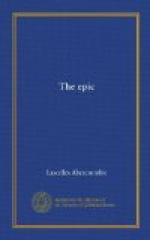We need not say that this is the lesson of Homer. And all this, barely stated, is a very different matter from what it is when it is poetically symbolized in the vast and shapely substance of the Iliad and the Odyssey. It is quite possible, of course, to appreciate, pleasantly and externally, the Iliad with its pressure of thronging life and its daring unity, and the Odyssey with its serener life and its superb construction, though much more sectional unity. But we do not appreciate what Homer did for his time, and is still doing for all the world, we do not appreciate the spirit of his music, unless we see the warfare and the adventure as symbols of the primary courage of life; and there is more in those words than seems when they are baldly written. And it is not his morals, but Homer’s art that does that for us. And what Homer’s art does supremely, the other early epics do in their way too. Their way is not to be compared with Homer’s way. They are very much nearer than he is to the mere epic material—to the moderate accomplishment of the primitive ballad. Apart from their greatness, and often successful greatness, of intention, perhaps the only one that has an answerable greatness in the detail of its technique is Beowulf. That is not on account of its “kennings”—the strange device by which early popular poetry (Hesiod is another instance) tries to liberate and master the magic of words. A good deal has been made of these “kennings”; but it does not take us far towards great poetry, to have the sea called “whale-road” or “swan-road” or “gannet’s-bath”; though we are getting nearer to it when the sun is called “candle of the firmament” or “heaven’s gem.” On the whole, the poem is composed in an elaborate, ambitious diction which is not properly governed. Alliteration proves a somewhat dangerous principle; it seems mainly responsible for the way the poet makes his sentences by piling up clauses, like shooting a load of stones out of a cart. You cannot always make out exactly what he means; and it is doubtful whether he always had a clearly-thought meaning. Most of the subsidiary matter is foisted in with monstrous clumsiness. Yet Beowulf has what we do not find, out of Homer, in the other early epics. It has occasionally an unforgettable grandeur of phrasing. And it has other and perhaps deeper poetic qualities. When the warriors are waiting in the haunted hall for the coming of the marsh-fiend Grendel, they fall into untroubled sleep; and the poet adds, with Homeric restraint: “Not one of them thought that he should thence be ever seeking his loved home again, his people or free city, where he was nurtured.” The opening is magnificent, one of the noblest things that have been done in language. There is some wonderful grim landscape in the poem; towards the middle there is a great speech on deterioration through prosperity, a piece of sustained intensity that reads like an Aeschylean chorus; and there is some admirable fighting,




